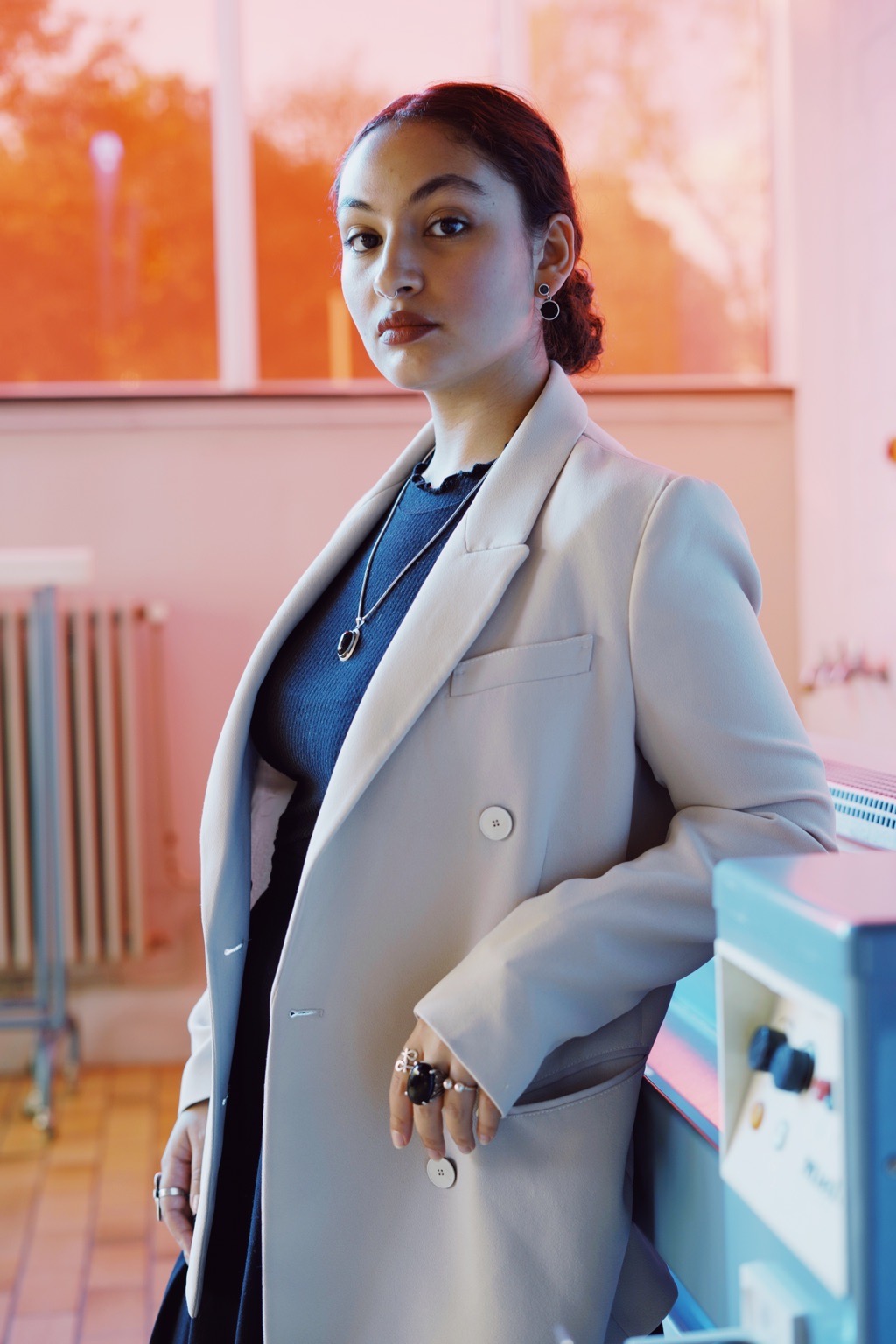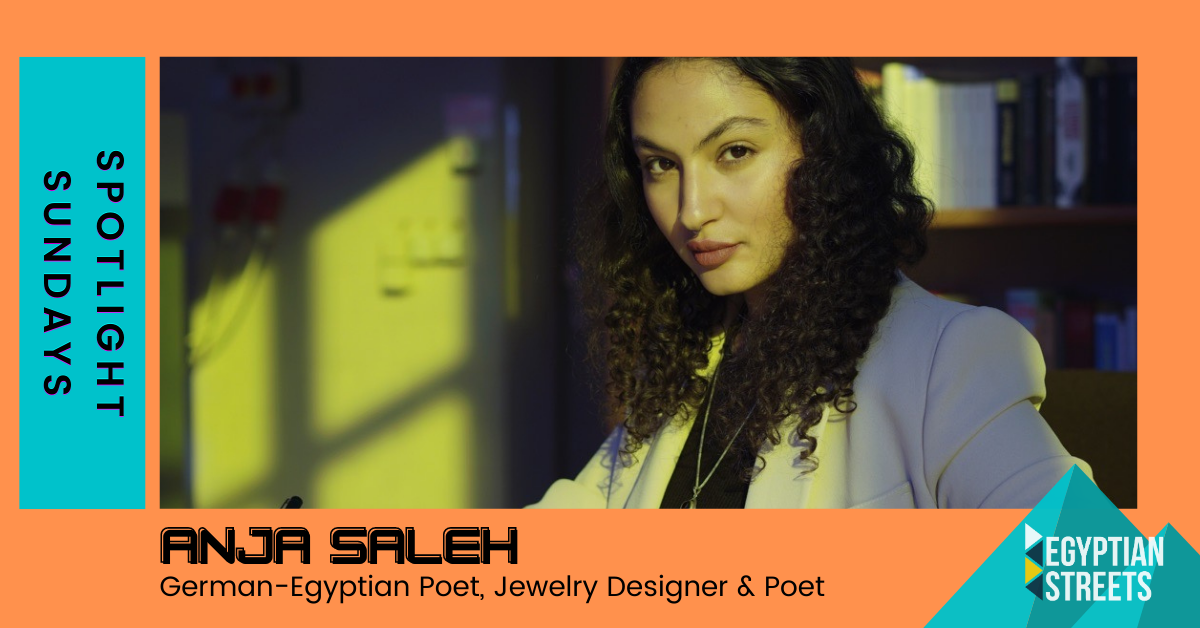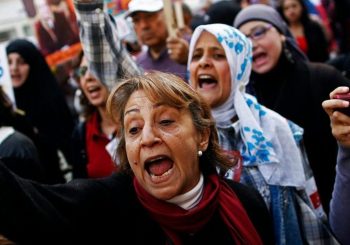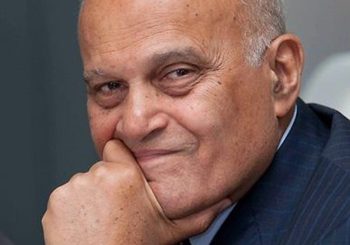Anja Saleh is a German-Egyptian with many talents, she runs TAVII Studio, and she currently has a poetry book available on pre-order called “Soon, The Future of Memory”. She is also an educator, and runs a creative academy called “Datteltäter Academy” remotely in Germany which is a fellowship that supports young BIPOC content creators in the video and art realm contributing to social discourse.
Egyptian Streets spoke with Saleh about her Egyptian and German identities as well as her creative aspirations.
Egyptian Streets: Tell us about yourself and what you do.
Anja Saleh: I’m Anja Saleh. I’m a writer, designer, and entrepreneur. My background is in social and political science, but right now I’m actually focusing on a creative academy that I’m managing, as well as writing and designing.
ES: When did you start getting into poetry?
Saleh: I cannot pin it down to a specific year or time. I know that at some point, I started writing as an outlet, and especially in English, because nobody could read English in my family at the time. I think this is how I kind of found my way from writing, into reading novels, to reading poetry, and to starting to write poetry myself. But it was very vague, I think around 14 or 15.
ES: What kind of topics does your poetry revolve around these days?
Saleh: I always call it a eulogy about the past, present, future, memory culture, memory politics, and how they are actually taking up a lot of space in our day to day without us really being aware of it. It’s also a lot about love, but when people hear love, we automatically think about that cheesy Hollywood romance stuff, and this is probably the furthest away from the love that I write about. I’m not sure if you are familiar with the book All About Love by Bell Hooks, but this is more the direction I’m going when I speak about love; about a more healthy connection to ourselves, despite memory culture and memory politics sometimes being quite deceiving. This manifests in the way we learn about history and the way we are made to view ourselves.
I think it is also important to mention that I’m Egyptian but I grew up in Germany, because of the context – even though I also know that memory culture within an Egyptian context is not necessarily one that makes Egyptians embrace or love their history, or know about all the nuances of the history. But I think that this “displacement” also plays a part, meaning me not being part of the majority society, but more of what they call a “minority”. It’s all these vague terms that I’m just putting into quotation marks because I don’t just want to mention them to throw them in.

ES: Can you tell us more about what you specifically mean by memory culture and memory politics?
Saleh: I think in poetry, it is more of how is Germany viewed in German history? And how much are we not being told of our history, but people know because it’s part of their direct history and direct oppression or privileges. It’s always this very linear display of achievements and development within a certain context. So you never have history of bad things except for something like the Holocaust that you cannot overlook. It’s very selective. It’s about what will make a nation look good, and I think in a German context, it’s worked extremely well internationally because people are mostly unaware of the racism, the oppression, the police brutality, all these things that are still taking place today, but we are known for good quality and efficiency and punctuality.
Even the stereotypes we have today play a part in this because 30, 40, 100 years from now, what we have today is going to be part of memory culture. This is where the title of my book “Soon, The Future of Memory” comes from, as well. Because we are also going to be a part of this memory, and this is why “Soon, The Future of Memory” because soon enough, we’re going to be the future of this memory that we probably won’t even know about anymore, because we’ll be long deceased.
ES: You mentioned your book, and you’ve been writing poetry for years, what finally prompted your book now?
Saleh: At some point in every writer’s life, I think, one of the thoughts is maybe I will publish a book someday, or maybe not.
I was reading poems at a literature festival in 2019, and this author that I had known as a political activist and author for a very long time was present. She approached me and said ‘I really liked what you were reading there. Would you consider publishing a book?’ My first instinct was ‘me, a book, Why?’ We talked about it, we met, she told me about her book series, which is in English, which is rare to find in Germany, and that it focuses on authors of African descent and black authors. It was perfect. Funnily enough, I didn’t take any of the poetry I wrote before 2019, because I did not see it in the book anymore, so I’m quite happy the opportunity never happened before.
ES: Pivoting from the book to your jewelry design, can you tell me about Tavii Studio and how that started?
AS: You are based in where I work with the manufacturers, I work with Cairene people mainly, but our last couple of collaborations was in Burkina Faso. Tavii Studio was launched in 2018 and one of the reasons was that my mom had been designing jewelry for over 10 years at the time. I’d always sit through the sessions with her, and when I was younger, it was boring. Then at some point, I got involved and was super cool and interesting and I started doing my own stuff. And I got really good feedback.
Then 2011 came, and the manufacturers that we’d been working with for so long, who partially became family, friends, were struggling a lot. So, me being young and naiive, I thought ‘let’s just work with them and then this ensures at least their payment and then I’ll figure the rest out.’ And it kind of worked out. But obviously, my contribution will not feed their families for three months.
Then, also, this was a time when I started researching memory, cultural memory and politics, in a deeper sense, and more emotional sense, all these layers of memory. And whenever I talk to someone they’d wear a beautiful ring and say ‘my grandmother gave me this to me’ or ‘this was my great, great grandmother’s’. So they were “hand-me-downs”, but really precious ones. Precious metals obviously outlive us, and thinking about the history of ancient Egypt, we still find gold and silver that is perfectly intact, and can still be used as artifacts that literally outlive generations and civilizations.
This grabbed me more into the historical context of jewelry, but also with me finding a lot of joy designing it.
I started Tavii studio not only as an online shop but also as a platform, I interviewed several people for the platform that I saw fitting. It’s to give these people space to just speak about what they think what they feel and not necessarily always connected to negative experiences, but just them and highlighting what they do.
ES: Where did the name Tavii come from?
Tavii is derived from Sema Tawy, which means the union of the two lands. For me personally, I have family from the Nubian regions of Egypt, and then also most of my family grew up in Cairo, which has a lot to do with the high dam that was built. So, this is a biographical reference to have the union of the two lands united in what I do, or united in what I create, but then also the two lands as in Egypt and Germany because there are two homes for me.
View this post on Instagram
ES: How does your Egyptian and African identity contribute to your art?
Saleh: Well, I think it contributes to my being so that just flows into the art immediately. I grew up extremely close to my heritage and to my other home, and it’s not just a fantasy, even though, and I think this is only fair to say there’s a lot of most about experiences that I have never made but I lived through my mom with a lot of things, be it painful or joyful things.
My mother is one of the main figures in the book, which at the beginning I did not realize. But she is my entrance into both worlds. Her experiences shaped my German experience because she came here as an immigrant who didn’t speak the language, didn’t know the system, and whose education was not acknowledged in this country. So there’s a lot of things that I had to learn from a very young age. And I got to know Germany from its ugliest sides through my mom, without her wanting this, obviously.
But I also got to know Egypt through my mother, because this is her home. She never left the country until she was almost 30 years old, so my mom is like my glasses that I see through. I lived very briefly in Egypt when I was younger but all I remember is my family, not the country, not the politics, not the history. It’s just a very firm part of me.
ES: You live abroad, and you have a broader view of identity and home that’s reflected in your work. Is there anything you wish that Egyptian readers knew, who perhaps may not identify with their African identity as much or are part of generations of distancing themselves away from that identity?
Saleh: This is a wound wide open, honestly. I think I was just lucky to grow up in a household where my mother said she was African before she was Egyptian. I think colonialism is hard just to get out of the minds of people, and it hurts me how present it is in the minds of Egyptians – and not only Egyptians, obviously, but this is the context we’re speaking in. When I used to wear my head cover in Egypt, people would say I looked African and I always wonder what they meant by that since we are all African, in fact. I understand that there is a lot of Egyptians that have a descent that is outside of Africa, a European or Turkish descent but it’s always startled me to be asked this question in Egypt with a surprise in their voice.
Because, how are you going to be surprised about me being African in Africa?
I also understand that there’s a lot of Arabization that happened that made people look upon Africanness as inferior, which is this notion of internalized racism and colonialism in a very multi-layered way.
When it comes to this, I’m quite clueless about how to tackle this. I just think that as such a powerful nation on the African continent, it would be wonderful if we were more aware of this and if this actually found a place in mainstream discourses, but then you always very quickly realize that most of these words and topics are not really advanced in Arabic. So you have a discourse on de-colonialism in English, which is the colonial language. And for the Nubian and a lot of Southern Egyptian regions, Arabic is also a colonial language, but then we need to talk about that, too.
There is a lot of pain connected to what I see. But I also realized in recent years that younger generations are more and more aware of it, and they’re reclaiming more, educating themselves and reading and participating, and that is something that makes me really happy and hopeful.
Anja’s Favorites
Favorite poet?
It’s a hard one, but I think for the past three years, Hanif Abdurraqib, African-American writer. I would even read an Instagram caption by him and I’d melt it and think ‘how sensitive can a person write?’ He’s honestly one of my favorite writers ever. There’s just so much sensitivity and his choice of words, and I don’t even know how to describe it.
Favorite country that you’ve visited?
I think South Africa and especially Johannesburg. People are different, very different vibe and very supportive. At the end of the day, wherever you go, it’s the people around you. In general, it was just this crazy mixture of very beautiful but also very rich in culture and then extremely kind people.
Favorite food?
Anyone who loves food doesn’t have one favorite food, I’m thinking of so many things. I love my mom’s mother Molokheya with prawns, and grilled fish, mom-style.
Favorite place in Egypt?
Shoubra Masr because it’s where my mom grew up. I’ve come to love and appreciate it more and more with age. The more I read about it, the more I remember it, the more I document it, the more I started loving it, to be honest.
Favorite Artist?
Favorite artist as a writer should be Zadie Smith, as well as Felwine Sarr, he makes music and he also writes and I just really admire how many things he’s doing and uniting them in just one person. I like that because usually, we’re being told you always have to settle for one discipline, and I resist it. He doesn’t settle for one discipline.
You can find Anja Saleh on Instagram, and you can purchase her book Soon, The Future Of Memory on her website.
This article is part of our ongoing initiative, Spotlight Sundays where we hope to celebrate different Egyptians from the community.
If you’d like to be featured or have any other enquiries, please email us at: [email protected]







Comments (2)
[…] Anja Saleh: German-Egyptian Poet and Designer Tackling Memory Culture and Heritage Starting 2021 With Disney’s ‘Soul’ […]
[…] […]